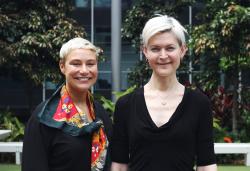
Within today’s fast-paced world, new and exciting technologies are emerging all the time. Things that were once science-fiction – think artificial intelligence, gene-editing, smart drugs – are now this side of reality.
But when considering emerging technology, a question arises. Do we truly know how an innovation may impact us?
For Dr Nicole Vincent, senior lecturer at UTS’s Faculty of Transdisciplinary Innovation (FTDI) and Dr Lily Frank, Assistant Professor at Eindhoven University of Technology’s (TU/e) Faculty of Industrial Engineering & Innovation Sciences, this is a major concern.
“We have been releasing technologies into the world. But we’ve been reckless,” says Dr Vincent. “Nobody actually considers, how is this thing going to change society?”
Dr Vincent and Dr Frank want to see greater awareness for ethics amongst technological innovators.
“I think it’s true that we’re all treated like guinea pigs for these emerging technologies, and it’s problematic that we don’t explicitly frame it that way,” says Dr Frank. “There’s a strain of ethics of technology that suggests we should think of these as social experiments and we should be keeping track of them.”
A key example, Dr Frank and Dr Vincent explain, is the proliferation of smart drug use amongst students and professionals.
‘Cognitive enhancers’ are sold as enablers for increased speed, productivity, and motivation at work. Their popularity is rising, particularly in high-stress fields like medicine or business. Many are repurposed ADHD medications taken by non-diagnosed individuals.
“I gave a TED talk where I made this argument: once we get safe, effective, and cheap cognitive enhancement medications, I’m going to start taking them because, hey, I want to write more papers,” says Dr Vincent. “Then Lily will feel like she has to take them, too, because she needs to be competitive. And then once she has it, the rest of our departments do. And then everyone around the world feels pressure.
“Talking to people in, say, Washington about this, they couldn’t understand [the dilemma],” Dr Vincent continues. “They all said students on campus should be allowed smart drugs because it’s a matter of liberty.
“But the actual issue isn’t, ‘Should you be allowed to use smart drugs?’; do you really want others to take smart drugs? Because once they do, you feel coerced to take them as well. And then any benefits you hoped to gain are still the ‘normal’. People focus on the liberty rather than what they want to reach in the future.”
For Dr Vincent and Dr Frank, considering the wider effects of situations like these is vital if we as humans want to maintain a fulfilling lifestyle. And yet, according to them, such technologies are entering the market with no proper forecast of their influence.
The key to solving this, they argue, is a broader change in the way we approach ethics. They propose a new scaffold for ethics and emerging technology.
“How do you frame the problem?” asks Dr Vincent. “If you present something as a medical problem, you look for a medical solution. For example, people are concerned how smart drugs might affect their health. But my concern is what it’s going to do to competition. That’s a social effect. How do you study a social side effect in a medical paradigm? In medicine, we have lab experiments, clinical trials, epidemiological data. None of that answers why we’re suddenly in a more horrible society because everyone is competing with smart drugs. Part of the reason these problems aren’t being looked at is because we’re studying issues within close frames. We need to be transdisciplinary.”
“With the speed of technological change,” Dr Frank adds, “it’s not because we can’t work fast enough to fix problems – it’s because everything is interconnected. The faster you problem-solve, the faster more problems come up. That’s why it’s important to have a future-focused approach.”
For Dr Frank, participating in the KTP program has opened up new opportunities for her research.
“I’ve met many people across UTS. People I couldn’t have met otherwise; but also people I didn’t realise I’d want to meet until coming here. This trip has opened up new possibilities for future collaborations. It’s given me insights into new fields of study.”
Dr Vincent adds, “I cannot overemphasise how important it’s been to have Lily here in-person. None of this stuff could have come out of phone conversations or writing journal articles.”
Meanwhile, the two hope that creating a simpler scaffold for technology ethics will encourage conscientiousness in the way we control our futures.
“Because we’re universities of technology, we’re designing all the stuff that’s actually doing this,” says Dr Vincent. “It’s our responsibility. A moral duty. And because both UTS and TU/e have a strong focus on socially-responsible innovation, the partnership makes sense.
“[Some people] argue that ethicists should get out of the way, that they don’t need us to scare them with dystopian scenarios. And that’s such a blinkered way of thinking about it. It’s irresponsible not to think of these changes.”

